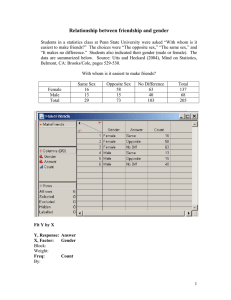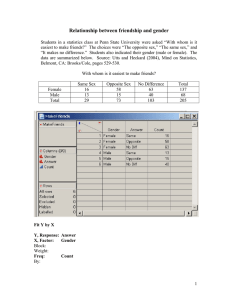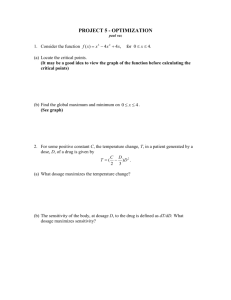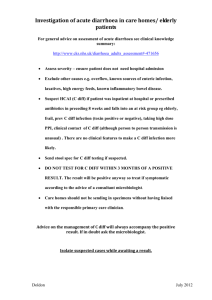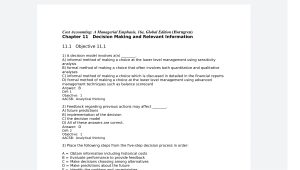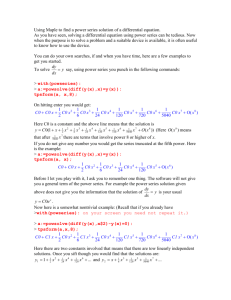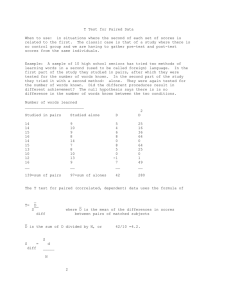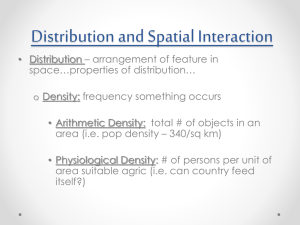Test Bank for Computers Are Your Future Complete 12th Edition by Cathy LaBerta sample chapter
advertisement
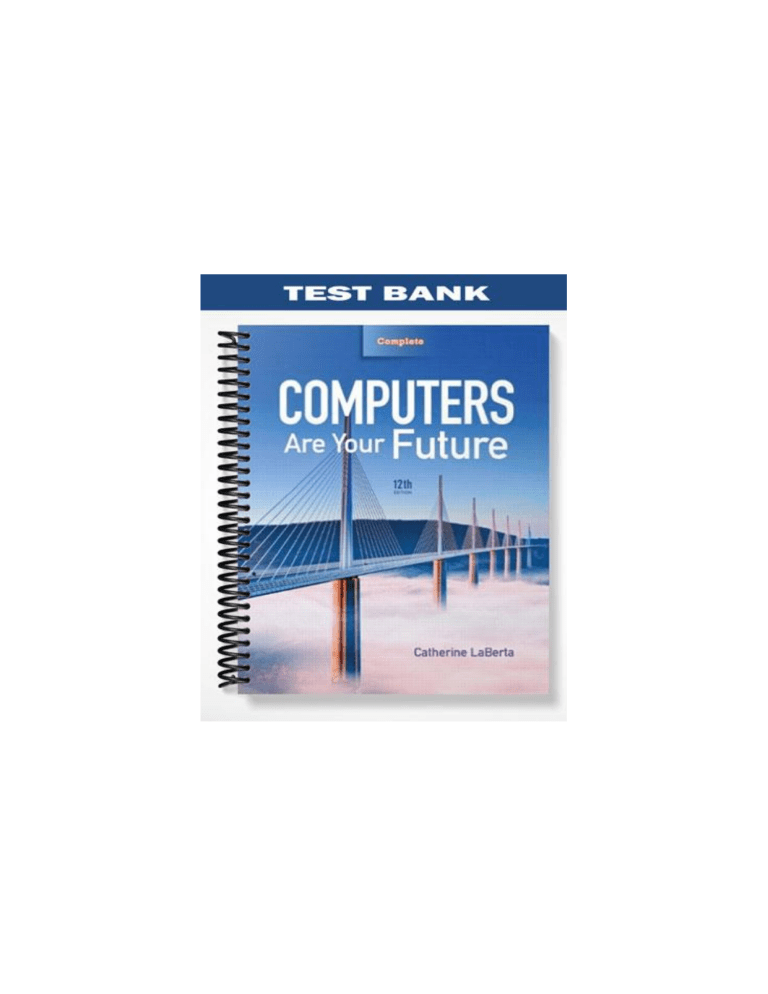
Computers Are Your Future, 12e (LaBerta) Chapter 2 Inside the System Unit 1) A byte: A) is the equivalent of eight binary digits. B) represents one digit in the decimal numbering system. C) is the smallest unit of information that a computer can process. D) can be compared to the state of one light switch being either on or off. Answer: A Diff: 2 Reference: Representing Data as Bits and Bytes 2) Computers count with ________ numbers. A) regular B) binary C) decimal D) digital Answer: B Diff: 2 Reference: Representing Data as Bits and Bytes 3) Of the following, which represents the largest amount of data? A) Terabyte B) Megabyte C) Petabyte D) Kilobyte Answer: C Diff: 2 Reference: Representing Data as Bits and Bytes 4) Approximately how much text is stored in a gigabyte? A) 1 page B) 1,000 pages C) 1 book D) 1,000 books Answer: D Diff: 3 Reference: Representing Data as Bits and Bytes 5) A yottabyte represents 1 ________ bytes. A) septillion B) million C) quadrillion D) trillion Answer: A Diff: 3 Reference: Representing Data as Bits and Bytes 1 Copyright © 2012 Pearson Education, Inc. Publishing as Prentice Hall 6) Five bits result in ________ possibilities. A) 5 B) 20 C) 26 D) 32 Answer: D Diff: 3 Reference: Representing Data as Bits and Bytes 7) Comparing a binary digit to a ________ is an easy-to-understand analogy. A) highway B) light switch C) storage bin D) memory chip Answer: B Diff: 3 Reference: Representing Data as Bits and Bytes 8) The hexadecimal representation for the decimal 10 is: A) 10. B) B. C) 15. D) A. Answer: D Diff: 3 Reference: Representing Data as Bits and Bytes 9) Hexadecimal numbers are represented using numbers 0 to 9 and letters ________. A) A to F B) A to Z C) A to D D) None of the above Answer: A Diff: 3 Reference: Representing Data as Bits and Bytes 10) A ________ is the smallest unit of information that a computer can work with. A) byte B) bit C) register D) hex Answer: B Diff: 2 Reference: Representing Data as Bits and Bytes 2 Copyright © 2012 Pearson Education, Inc. Publishing as Prentice Hall 11) Floating-point notation: A) has no advantage if used with numbers containing fractional points. B) uses no fixed number of digits before or after the decimal point. C) requires newer computers to have a special chip called a math coprocessor. D) allows the computer to work with very large, but not very small, numbers. Answer: B Diff: 2 Reference: Representing Very Large and Very Small Numbers 12) All of the following are examples of character codes EXCEPT: A) SCSI. B) ASCII. C) EDCDIC. D) Unicode. Answer: A Diff: 2 Reference: Representing Characters: Character Code 13) An algorithm used as a bridge between binary code and keyboard characters is known as: A) cache. B) hot swapping. C) data dependency. D) character code. Answer: D Diff: 2 Reference: Representing Characters: Character Code 14) ________ is becoming more popular than previously used character codes due to its ability to represent most, if not all, of the world's languages. A) Extended ASCII B) ASCII C) Unicode D) EDCDIC Answer: C Diff: 2 Reference: Representing Characters: Character Code 15) The most widely used character code is: A) EBCDIC. B) HTML. C) ASCII. D) Unicode. Answer: C Diff: 2 Reference: Representing Characters: Character Code 3 Copyright © 2012 Pearson Education, Inc. Publishing as Prentice Hall 16) The ________ contains a computer's main hardware components. A) motherboard B) system unit C) CPU D) master case Answer: B Diff: 1 Reference: Introducing the System Unit 17) Which of the following components would NOT be found inside the system unit? A) Motherboard B) USB port C) Power supply D) Cooling fan Answer: B Diff: 1 Reference: Inside the System Unit 18) In the strictest sense of the term, the ________ contains the CPU. A) system unit B) unit frame C) motherboard D) computing platform Answer: C Diff: 1 Reference: Inside the System Unit 19) Which of the following would NOT be found on the motherboard? A) Microprocessor B) System clock C) Drive bays D) Input/output buses Answer: C Diff: 2 Reference: What's on the Motherboard? 20) The central processing unit (CPU): A) plays a minimal role in processing data. B) is different from a microprocessor. C) is a fairly simple device. D) is an integrated chip capable of processing signals. Answer: D Diff: 1 Reference: The CPU: The Microprocessor 4 Copyright © 2012 Pearson Education, Inc. Publishing as Prentice Hall 21) A processor's instruction set: A) is unique to the type of processor. B) is the same for different types of processors. C) will run programs that were created for an incompatible processor. D) has nothing to do with the ability of the computer to run a program. Answer: A Diff: 2 Reference: The Instruction Set 22) The four-step process of fetch, decode, execute, and store is called a(n): A) arithmetic operation. B) machine cycle. C) instruction cycle. D) logical operation. Answer: B Diff: 1 Reference: Microprocessor Performance 23) Which of the following subcomponents of the CPU takes instructions from memory and decodes and executes the instructions? A) Arithmetic-logic unit B) Microprocessor C) Data bus D) Control unit Answer: D Diff: 2 Reference: Microprocessor Performance 24) Which of the following is NOT one of the steps in the machine cycle? A) Pipeline B) Decode C) Execute D) Store Answer: A Diff: 2 Reference: Microprocessor Performance 25) The greater the number of ________ on a microprocessor, and proximity to each other, the faster the processing speed. A) transistors B) disks C) buses D) registers Answer: A Diff: 2 Reference: Microprocessor Performance 5 Copyright © 2012 Pearson Education, Inc. Publishing as Prentice Hall 26) Which of the following operating systems was the first to use the 64-bit technology? A) Mac OS X B) Linux C) MS-DOS D) Windows XP Answer: B Diff: 3 Reference: Data Bus Width and Word Size 27) A CPU's word size is important because it determines which ________ the CPU can use. A) application software B) input devices C) disk storage D) operating system Answer: D Diff: 3 Reference: Data Bus Width and Word Size 28) The number of operations per clock tick affects: A) microprocessor performance. B) monitor resolution. C) disk drive capacity. D) the bus size. Answer: A Diff: 1 Reference: Operations per Cycle 29) A technique that uses more than one processor to execute a program is called: A) parallel processing. B) serial processing. C) co-processing. D) megaprocessing. Answer: A Diff: 1 Reference: Parallel Processing 30) Which of the following input/output buses is used by today's PCs? A) PCI B) CPU C) L2 D) AGP Answer: A Diff: 2 Reference: The Chipset and the Input/Output Bus 6 Copyright © 2012 Pearson Education, Inc. Publishing as Prentice Hall 31) RAM stands for: A) rapidly accessed memory. B) random access memory. C) reliable associated memory. D) repeated auxiliary memory. Answer: B Diff: 1 Reference: RAM 32) Each memory address is stored in ________ form. A) serial B) compressed C) parallel D) binary Answer: D Diff: 1 Reference: RAM 33) Although introduced in 1995, the USB didn't become widely used until the release of the: A) Blackberry. B) iMac. C) iPod. D) iTunes. Answer: B Diff: 3 Reference: USB Ports 34) A memory ________ is the amount of RAM a program uses when it is operational. A) stash B) footprint C) cache D) utility Answer: B Diff: 1 Reference: RAM 35) Which of the following types of memory has L1, L2, and L3 levels of storage? A) RAM B) ROM C) cache D) flash Answer: C Diff: 1 Reference: Cache Memory 7 Copyright © 2012 Pearson Education, Inc. Publishing as Prentice Hall 36) How many peripheral devices can be connected to a single USB port? A) 1 B) 8 C) 64 D) 127 Answer: D Diff: 3 Reference: USB Ports 37) On non-Apple systems, the FireWire port is called a ________ port. A) 1439 B) 2008 C) 1995 D) 1394 Answer: D Diff: 2 Reference: 1394 Ports (FireWire) 38) The ExpressCard is also known as the ________ card. A) SCSI B) PCMCIA C) PS/2 D) VGA Answer: B Diff: 1 Reference: Additional Ports and Connectors 39) The ExpressCard provides enhancements in all of the following areas EXCEPT: A) wireless communication. B) additional memory. C) multimedia. D) cost. Answer: D Diff: 1 Reference: Additional Ports and Connectors 40) If your computer doesn't have enough USB ports, it is possible to obtain a USB ________. A) hub B) router C) PBX D) multiplexer Answer: A Diff: 3 Reference: USB Ports 8 Copyright © 2012 Pearson Education, Inc. Publishing as Prentice Hall 41) ________ numbers consist of only two digits. Answer: Binary Diff: 1 Reference: Representing Data as Bits and Bytes 42) A(n) ________, also known as a PB, is equivalent to a quadrillion bytes. Answer: petabyte Diff: 1 Reference: Representing Data as Bits and Bytes 43) ________-point notation is used to represent exceedingly large or exceedingly small numbers as well as numbers with fractional parts. Answer: Floating Diff: 2 Reference: Representing Very Large and Very Small Numbers 44) A(n) ________ is the smallest piece of information with which a computer can work. Answer: bit Diff: 1 Reference: Representing Data as Bits and Bytes 45) The American ________ Code for Information Interchange (ASCII) character code is most widely used on minicomputers, personal computers, and computers that make information available on the Internet. Answer: Standard Diff: 2 Reference: Representing Characters: Character Code 46) The amount of room that a system unit needs to fit on the desk is called the ________. Answer: footprint Diff: 1 Reference: Introducing the System Unit 47) The arrangement of internal components within the system unit is called the ________ factor. Answer: form Diff: 2 Reference: Introducing the System Unit 48) The ________ is the large printed circuit board that holds the computer's important components such as the microprocessor. Answer: motherboard Diff: 1 Reference: What's on the Motherboard? 9 Copyright © 2012 Pearson Education, Inc. Publishing as Prentice Hall 49) Calculations and comparisons are performed in the ALU, also known as the ________-logic unit. Answer: arithmetic Diff: 2 Reference: Microprocessor Performance 50) A machine cycle includes the instruction cycle and the ________ cycle. Answer: execution Diff: 1 Reference: Data Bus Width and Word Size 51) The maximum number of bits processed by the CPU is called its ________ size. Answer: word Diff: 1 Reference: Data Bus Width and Word Size 52) Superscalar architecture takes advantage of ________ to perform more than one instruction per clock tick. Answer: pipelining Diff: 2 Reference: Operations per Cycle 53) A collection of chips that are designed to move data between the microprocessor and the rest of the computer is called the ________. Answer: chipset Diff: 2 Reference: The Chipset and the Input/Output Bus 54) A computer uses ________ memory when the RAM gets full. Answer: virtual Diff: 3 Reference: RAM 55) Memory that the processor can use to store frequently accessed program instructions and data to improve the overall speed of the computer is called ________ memory. Answer: cache Diff: 1 Reference: Cache Memory 56) ________ or L1 cache memory is located in the microprocessor chip. Answer: Primary Diff: 1 Reference: Cache Memory 57) The official name for Apple FireWire or Sony i.Link ports is an IEEE ________ port. Answer: 1394 Diff: 2 Reference: 1394 Ports (FireWire) 10 Copyright © 2012 Pearson Education, Inc. Publishing as Prentice Hall 58) Being able to connect and disconnect peripheral devices without having to shut the computer down is called ________ swapping. Answer: hot Diff: 2 Reference: USB Ports 59) A(n) ________ is an electronic switch that directs the flow of electrical signals in a computer. Answer: transistor Diff: 2 Reference: What's on the Motherboard? 60) ________ is older technology, device, or application that is being phased out in favor of advance in new technology. Answer: Legacy technology Diff: 2 Reference: Additional Ports and Connectors 61) The Core i7 Extreme Edition microprocessor has a clock speed of ________. Answer: 3.30 GHz Diff: 2 Reference: Popular Microprocessors 62) Heat is removed from the CPU by using heat sink or ________. Answer: fan Diff: 1 Reference: Processor Slots and Sockets 63) An integrated circuit contains millions of ________. Answer: transistors Diff: 2 Reference: What's on the Motherboard? 64) The ________ step in the machine cycle interprets what action the program is telling the computer to perform. Answer: decode Diff: 1 Reference: Microprocessor Performance 65) The maximum number of bits processed by the CPU is called its ________ size. Answer: word Diff: 1 Reference: Data Bus Width and Word Size 66) The newest standard for the PC card, mostly used in notebooks, is called the ExpressCard. Answer: TRUE Diff: 2 Reference: Additional Ports and Connectors 11 Copyright © 2012 Pearson Education, Inc. Publishing as Prentice Hall 67) Biometric authentication is individualized and cannot be fooled. Answer: FALSE Diff: 2 Reference: Introducing the System Unit 68) A byte is the smallest unit of information. Answer: FALSE Diff: 2 Reference: Representing Data as Bits and Bytes 69) Hexadecimal numbers use the numbers 0 to 9 and the letters A to F. Answer: TRUE Diff: 2 Reference: Representing Data as Bits and Bytes 70) Hexadecimal uses base 16 characters. Answer: TRUE Diff: 2 Reference: Representing Data as Bits and Bytes 71) The form factor is a specification for how internal components are mounted in the system unit. Answer: FALSE Diff: 2 Reference: Introducing the System Unit 72) The motherboard contains the CPU. Answer: TRUE Diff: 1 Reference: Inside the System Unit 73) A heat sink keeps the system unit cool. Answer: TRUE Diff: 2 Reference: Processor Slots and Sockets 74) Intel is the only producer of PC chips. Answer: FALSE Diff: 2 Reference: The Instruction Set 75) A memory address is stored in binary form. Answer: TRUE Diff: 2 Reference: RAM 12 Copyright © 2012 Pearson Education, Inc. Publishing as Prentice Hall 76) PROM requires a special device to write instructions on a blank chip one time only. Answer: TRUE Diff: 2 Reference: ROM 77) EPROM can only be rewritten twice. Answer: FALSE Diff: 2 Reference: ROM 78) Keeping secondary cache as close as possible to the processor improves performance. Answer: TRUE Diff: 2 Reference: Cache Memory 79) The drive activity light tells you when the hard drive is accessing data. Answer: TRUE Diff: 2 Reference: The Front Panel 80) USB stands for Universal Serial Bus. Answer: TRUE Diff: 1 Reference: USB Ports 81) Computer manufacturers are increasing numbers of USB ports because of their convenience and versatility. Answer: TRUE Diff: 2 Reference: USB Ports 82) Additional circuit boards are installed at expansion slots. Answer: TRUE Diff: 2 Reference: Inside the System Unit 83) The system unit houses the computer’s peripheral hardware components. Answer: FALSE Diff: 2 Reference: Introducing the System Unit 84) If a program is compatible, it is said to be a native application for a given processor design. Answer: TRUE Diff: 2 Reference: The Instruction Set 13 Copyright © 2012 Pearson Education, Inc. Publishing as Prentice Hall 85) There are five steps of the machine cycle. Answer: FALSE Diff: 1 Reference: The Machine Cycle 86) The instruction cycle includes decode and execute. Answer: FALSE Diff: 2 Reference: The Machine Cycle 87) DDR2-SDRAM and DDR3-SDRAM need to have a constant power supply to avoid losing their contents. Answer: TRUE Diff: 2 Reference: RAM 88) A machine cycle includes the instruction cycle and the execution cycle. Answer: TRUE Diff: 1 Reference: Data Bus Width and Word Size 89) The execute step in the machine cycle interprets what action the program is telling the computer to perform. Answer: FALSE Diff: 1 Reference: Microprocessor Performance 90) The bus used for video and graphics displays is known as the AGP or Accelerated Graphics Port. Answer: TRUE Diff: 1 Reference: The Chipset and the Input/Output Bus 14 Copyright © 2012 Pearson Education, Inc. Publishing as Prentice Hall Match the following terms to their descriptions: A) The number system used by computers B) Most widely used character code C) Uses base 16 characters to represent binary numbers D) A character coding method created by IBM and used on its mainframes E) One quintillion bytes 91) ASCII Diff: 3 Reference: Representing Characters: Character Code 92) Binary Diff: 3 Reference: Representing Data as Bits and Bytes 93) EBCDIC Diff: 3 Reference: Representing Characters: Character Code 94) Hexadecimal Diff: 3 Reference: Representing Data as Bits and Bytes 95) Exabyte Diff: 3 Reference: Representing Data as Bits and Bytes Answers: 91) B 92) A 93) D 94) C 95) E 15 Copyright © 2012 Pearson Education, Inc. Publishing as Prentice Hall Match the following terms to their meanings: A) The amount of space taken up by the case on the desk B) Any size of case that contains the computer's main hardware C) Specification for mounting internal components such as the motherboard D) Performs a specific action such as adding two numbers E) Prevents computer components from being damaged by heat 96) System unit Diff: 2 Reference: Introducing the System Unit 97) Footprint Diff: 2 Reference: Introducing the System Unit 98) Form factor Diff: 2 Reference: Introducing the System Unit 99) Cooling fan Diff: 2 Reference: Inside the System Unit 100) Execute Diff: 1 Reference: Microprocessor Performance Answers: 96) B 97) A 98) C 99) E 100) D 16 Copyright © 2012 Pearson Education, Inc. Publishing as Prentice Hall
